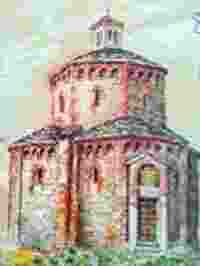Prophet

Malachi
Saint Malachi, prophet, after his return from Babylon foretold the great day of the Lord and his coming into the temple and that always and everywhere a pure oblation must be offered to his name.
Roman Martyrology, 18 December, n. 1.
Join us
Malachi Prophet
The biblical book of Malachi is the last of the Old Testament. The prophet defends God's unchangeable principles, mercy and his love for him, and highlights God's love for a rebellious Israel. The author wrote it in the second half of the 5th century BC, therefore in the period of post-exilic reconstruction.
The sins that Malachi reproaches are the same ones that Nehemiah reproached. In Israel the priesthood was tainted, marriage tainted by mixed marriages with foreign women and divorces from Israelites, tithing - which was to be recognized by law to the Levites - was withheld, and much more. It was the sins of the priests that compromised the ritual purity: they offered defective animals and neglected their duty, the celebration of worship and their life had become two separate and independent spheres, rather than interpenetrating one another.
"Where is My honor?" God asked the priests of Israel, because they showed so little respect and honor to Him in their sacrifices, they offered tainted food and animals that were blind, lame or sick. The priests were not grateful for their ministry, for their work before the Lord. They complained about what people gave, they were not even aware that they despised God with their actions; they probably did not know the extent of their offense and slowly slipped into contempt for God's name.
For this they were punished; Malachi reveals that the calamities that, for such sins, had already befallen the people: the grasshoppers, the drought, the poor harvest ... They would cease as soon as they repented. And then he speaks of the burning day of divine punishment, where the difference between the righteous and the wicked will be seen: While for the former "the sun of justice" will rise, the others will be destroyed.
In his invitation to conversion it is extremely peremptory: rather than continuing like this, it would be better to close the doors of the Temple. "Oh, there were some among you who close the doors, so that my altar may no longer burn in vain! I am not pleased with you, says the Lord of hosts, I do not accept the offering of your hands" (Ml 1,10). The pagans magnify the name of God better, while Israel is profaning it with a treacherous cult: "From east to west my name is great among the nations; in every place incense is burned to my name and offerings are also made; for great is my name among the nations, says the Lord of hosts. But you profane him".
(Ml 1,11).
For God it would have been better to close the doors rather than continue a useless worship. However, He will not go on without worship: if the priests and the people of the Jewish people had not worshiped him in the Spirit and in the truth, God would find His faithful among the Gentiles. Malachi carried out his ministry in a time of great social and religious uncertainty, he took up the questions of his people: Does God not see the obscure actions of the wicked? positively to the well-working of the pious?
The answer is that there will be a new day of creation, "the day that I prepare": "Behold, for the day is about to come as hot as an oven. Then all the proud and all those who commit injustice will be like straw; that day coming he will set them on fire - says the Lord of hosts - so as to leave them neither root nor sprout".
(Ml 3,19)
It will be a day of judgment, recalled here by the image of fire: fire in fact purifies, consumes. The wicked, the presumptuous, will be struck like straw burnt by the fire, which without hope "leaves them neither root nor sprout". But "the day of the Lord" will also arrive as an event of salvation, despite the apparent absurdity of a troubled life: "For you, on the other hand, lovers of my name, the sun of justice will rise and you will leap out like calves from the stable".
(Ml 3.20).
God will send the messenger of the covenant, who will prepare the way for him, will enter the Temple and will purify it with "the fire of the smelter" and with "the potash of the washing machines". Then the offering will become agreeable: "He will refine them as gold and silver are made; and they will offer just offerings to the Lord" (Ml 3,3). Israel will be great among the nations and the righteous will be especially dear to God, who has "a book of memoirs".
Malachi's prophecy is more relevant than ever. We live in times when every value seems to have been trampled on and what matters is only having, success, one's own gain in a hopeless society. The word of the prophet invites us today, as in that time, to rediscover hope, because God is the Lord of the history of the past, present and future, and his intervention is certain.
